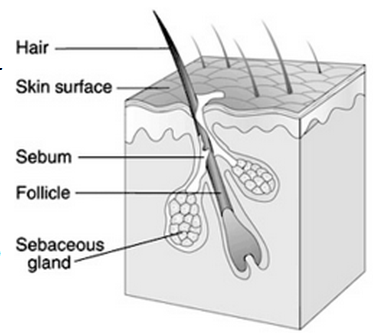The Top 5 Causes of Acne

When there is too much sebum (oil) - it fills up the shaft area of the follicle, allows bacteria to grow, causing even more blockage and infection
All acne has one primary cause.
Simply put, you have sebaceous (oil) glands under your skin near the base of hair follicles. These oil glands produce oil called sebum, and sometimes they produce too much oil. This excess of oil (sebum) causes blockages at the skin surface, and bacteria commonly called acne bacteria grows there, causing the redness we all know as the acne spot. Please take a moment to look at the graphic (used with permission from Wikipedia).
Both the blackhead and the whitehead pimples are caused by this simple chain of events.
Most Teenage Outbreaks Of Acne Are First Caused By Hormone Changes
If you first had acne as a teenager, you can be pretty sure it was caused by hormone changes as a result of changes in your body. A very slight hormone change can cause the fat glands (sebacious glands) to produce a little too much fat (sebum), allowing the acne bacteria to grow and cause the first pimples of acne.
Stress Is An Important Factor
Stress makes acne worse! Whether it’s the stress of the teenage years, or college, or financial stress, your acne gets worse when you are under stress and not handling it well.
In an interesting study done for the Center for Disease Control, university students were studied to discover the relationship between stress and acne. Sure enough, at stressful periods throughout the year (like exam times) the students acne was much worse.
Dermatologists say that the higher levels of acne they see in mature women results from greater stress their patients are experiencing.
Your Genetics And Acne
Acne does tend to run in families. Your genetic heritage helps to determine your basic levels of hormones, as well as the oiliness and thickness of your skin. Even the response to stress is understood by most scientists to have a genetic component. These all have an influence on acne.
Acne Is Often Caused And Cured By Your Diet
Dermatologists and scientists used to believe that diet had very little to do with acne. But modern research is confirming what natural healers have said all along. A bad diet high in sugars and junk food can indeed cause your oil glands to go into overdrive, allow acne bacteria to thrive, and your acne to break out.
A study at the Royal Melbourne Hospital Department of Dermatology was designed to test how much diet influenced acne. One group of patients had a very healthy diet of whole grains, pasta, beans, vegetables, and high protein foods. The others ate a diet high in white bread, potatoes, and sugary drinks and snacks. After 12 weeks, the healthier diet produced a 50% reduction in Acne.
A Vitamin Deficiency Can Mean More Acne Breakouts
Unless you have outstanding healthy eating habits, you might have an important vitamin deficiency that is causing or contributing to your acne. Here’s a very quick look at the most important vitamins for healthy clear skin.
- Vitamin E has long been known to help skin heal from cuts and injuries, and now is believed to be important in many healthy skin functions.
- Dermatologists recommend that Vitamin A is very important for your skin. Even a small deficiency results in dry and rough skin, and increased acne break outs.
- Modern research is finding important reasons to take more Vitamin D with every new research study. A regular Vitamin D supplement is proven to reduce acne.
- Niacin opens up the blood vessels, directly helping to clear out clogged pores and clumps of acne bacteria that is the basis of all pimples and acne.
- Zinc is a well known trace mineral, and is included in many natural acne treatments. Medical science is only now adding zinc to their treatments, because of the effectiveness of natural treatments containing zinc.
Read About Natural Treatments & Cures For Acne
There are many articles on this site that will help you defeat your acne!
Here are links to some recent articles, but check back often because there are great new treatments every day — and you can read about them here.





Hi Zaria,
My dermatologist has told me about the causes of Acne, and I have tried to read about it on the internet.
But I’ve never seen it explained in such a simple and understandable way before. Thanks!